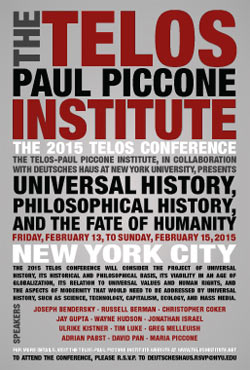 Archaeologists have found the oldest known example of complex intergenerational cooperation at Göbekli Tepe in southern Turkey. Thirty miles away, just across the Syrian border, is the latest flashpoint of a complex intergenerational conflict—what President Obama calls the “barbarism” of the Islamic State.[1] What does the world’s oldest civilization have to do with the world’s newest barbarians? Both show the fundamental role of religion in organizing human societies. Viewing civilization as the product of religion bucks a long academic tradition. A consensus holds that human culture is an adaptive response to the environment. Ecological factors shape the economic base of society, molding civilizations in different ways. Thus, in the “Neolithic Revolution” hypothesis of V. Gordon Childe, civilization originated when the global climate warmed some 12,000 years ago, such that human beings could cultivate grains in fertile river valleys (Mesopotamia, Egypt, India, and China). This was the economic base upon which a civilizational superstructure—hierarchies, regimes, and religion itself—was built.
Archaeologists have found the oldest known example of complex intergenerational cooperation at Göbekli Tepe in southern Turkey. Thirty miles away, just across the Syrian border, is the latest flashpoint of a complex intergenerational conflict—what President Obama calls the “barbarism” of the Islamic State.[1] What does the world’s oldest civilization have to do with the world’s newest barbarians? Both show the fundamental role of religion in organizing human societies. Viewing civilization as the product of religion bucks a long academic tradition. A consensus holds that human culture is an adaptive response to the environment. Ecological factors shape the economic base of society, molding civilizations in different ways. Thus, in the “Neolithic Revolution” hypothesis of V. Gordon Childe, civilization originated when the global climate warmed some 12,000 years ago, such that human beings could cultivate grains in fertile river valleys (Mesopotamia, Egypt, India, and China). This was the economic base upon which a civilizational superstructure—hierarchies, regimes, and religion itself—was built.
|
By Robert Wyllie · Monday, April 6, 2015 |
Current IssueSubscribe to TelosNow Available!Recent PostsTELOSscope Archives |
|||
|
Telos Press Publishing · PO Box 811 · Candor, NY 13743 · Phone: 212-228-6479 Privacy Policy · Data Protection Copyright © 2025 Telos Press Publishing · All Rights Reserved Our website uses cookies to enhance your experience and show you more relevant content.
For more information, please see our privacy policy. By using our site, you agree to our use of cookies. OK |
||||


